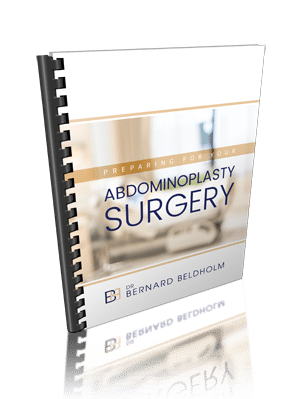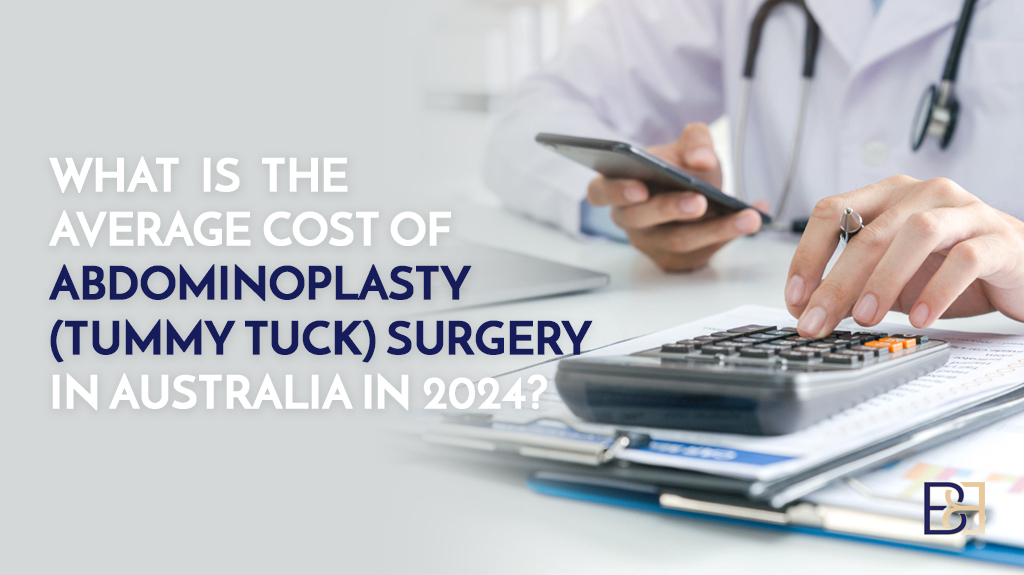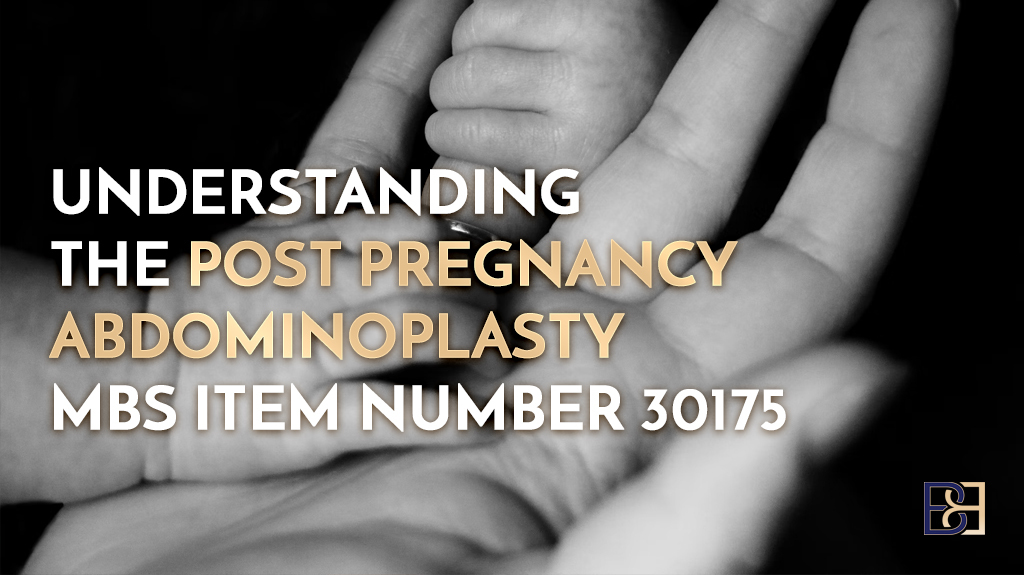Abdominoplasty is a major surgery as it removes significant excess skin, the body’s largest organ. Other reasons I categorise it as a major surgery include the risks involved, the complexity of the procedure, the use of general anaesthesia, the length of hospital stay, and the altering of the anatomical structure.
Are you dissatisfied with the loose skin and fat on your abdomen? I suggest you come into my office to discuss whether abdominoplasty could be an option.
However, I must mention that getting this body-contouring procedure is a big decision that requires time to consider because no matter how it might seem, a tummy tuck (abdominoplasty) is a major surgery.
Keep reading this article to understand why I consider abdominoplasty a major surgery.
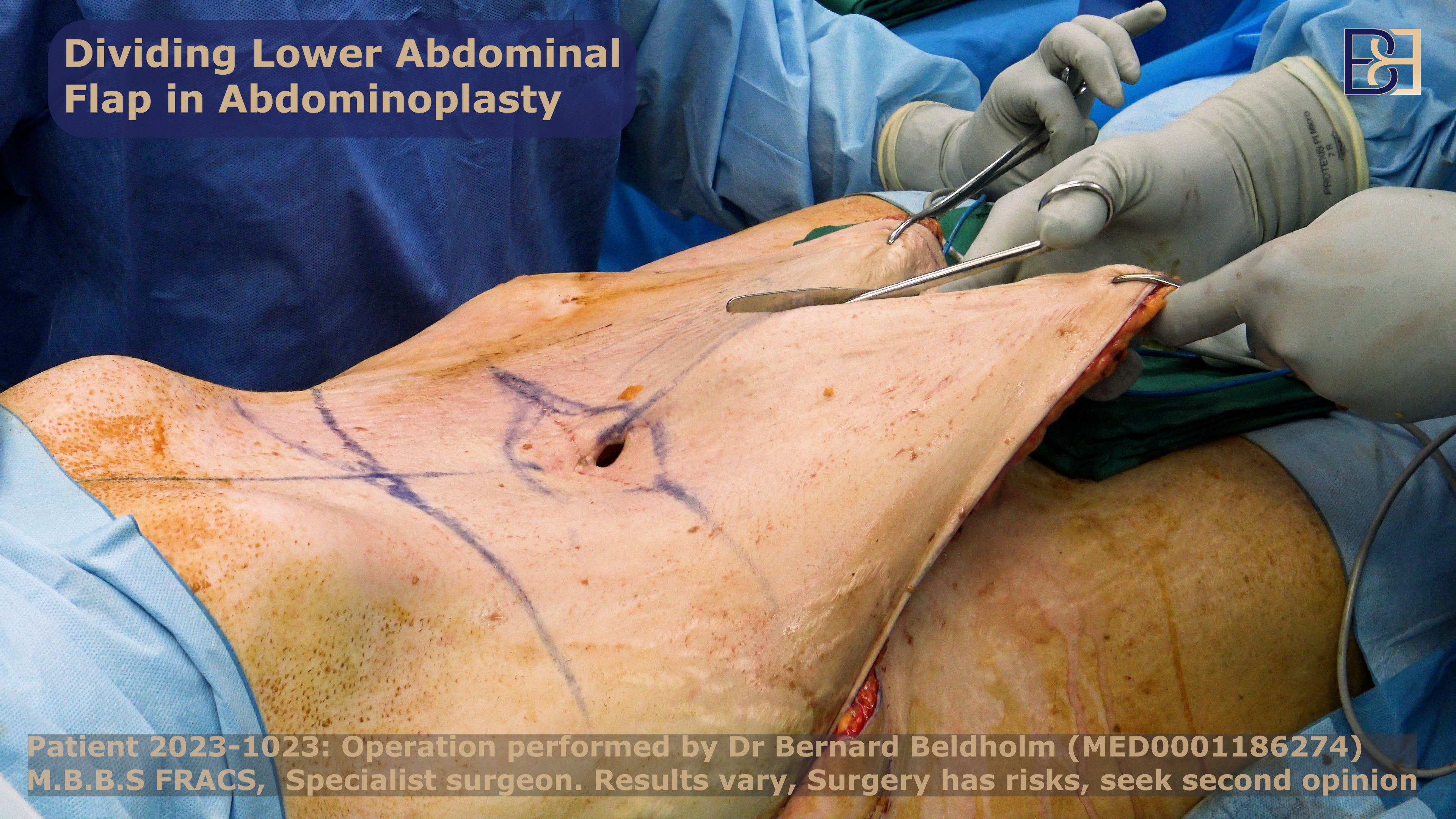
Book your appointment online now
Major Vs. Minor Surgery
Merriam Webster defines a major surgery as surgery involving a risk to the life of the patient, or an operation upon an organ within the cranium, chest, abdomen, or pelvic cavity. Those of us in the medical profession define major organs as any part you cannot live without, such as the heart, brain, liver, and yes, the skin.
Minor surgeries, on the other hand, are procedures that are less invasive, usually involving internal structures and tissues close to the skin’s surface. A good example of a minor surgery is laparoscopic or arthroscopic surgery.
Since major surgeries involve major body organs, they carry more risks, especially surgical ones. Furthermore, the extensive nature of major procedures normally leads to a longer surgery and time under anaesthesia, as well as a more extensive recovery time than minor surgeries.
Why Abdominoplasty is Considered Major Surgery
Below are a few reasons why I classify abdominoplasty as a major surgery.
Complexity of procedure
Surgical site
Use of general anaesthesia
Overnight stay in hospital
Several weeks of recovery time involved
Alters the anatomic structure of the body
Risks involved
An abdominoplasty (tummy tuck) is a complex procedure following massive weight loss that involves removing excess skin and excess fatty tissue in the abdominal area, muscle repair (when needed), the use of general anaesthesia, a minimum of one overnight stay in the hospital, several weeks or months of recovery time, and poses several risks. For these reasons, abdominoplasty is considered a major surgery.
The excess skin and fat I’ll remove can cause significant tissue trauma. Furthermore, your procedure might require the separation of your abdominal muscles (diastasis recti), making it more invasive.
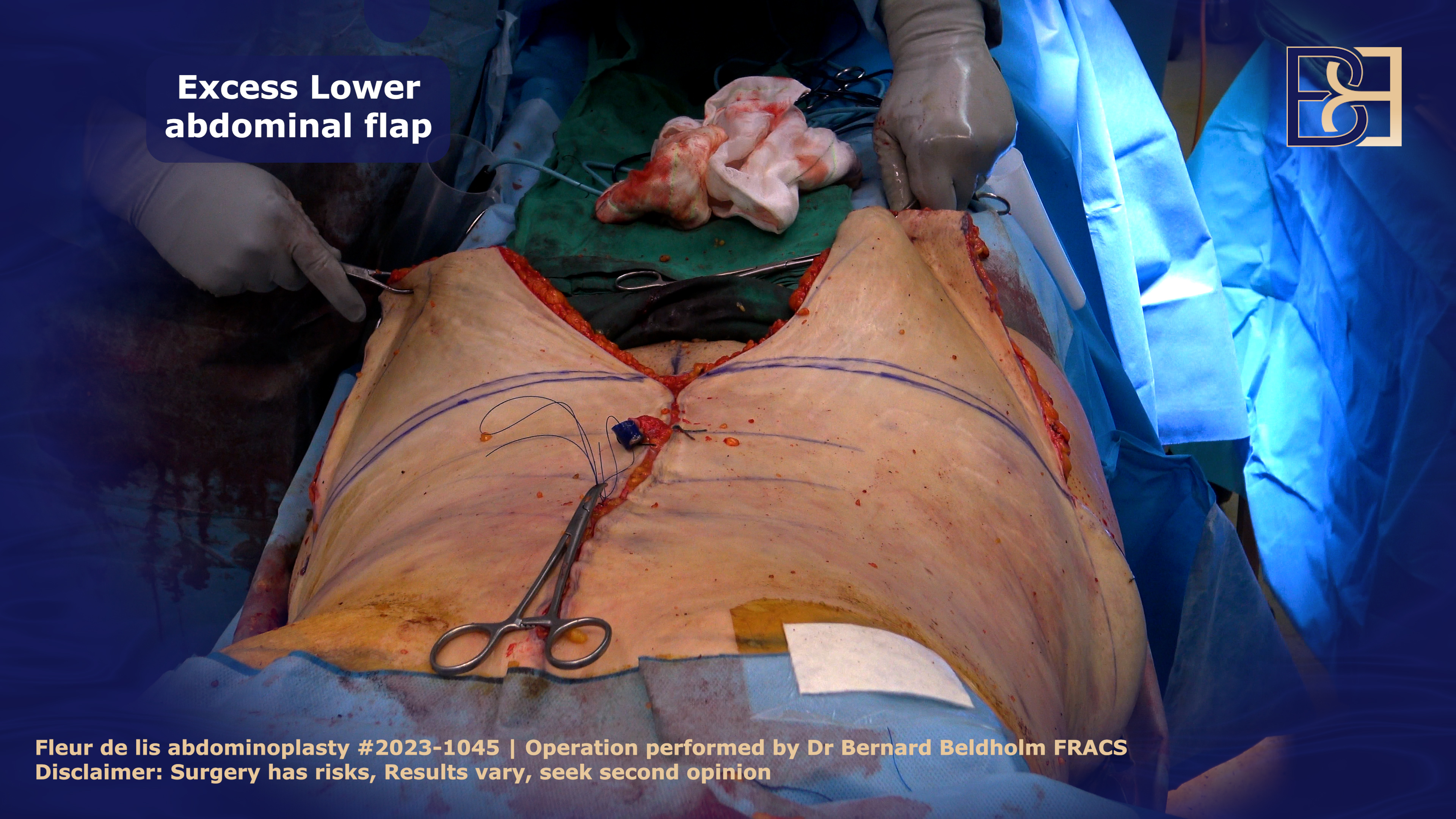
Types Of Abdominoplasty Surgery
There are different types of Abdominoplasty
Mini Abdominoplasty
Full Abdominoplasty
Extended
Fleur de lis Abdominoplasty

Abdominoplasty
The procedure involves the removal of a minimal amount of redundant skin from the lower abdomenMini Abdominoplasty Surgery
Though it is the least invasive abdominoplasty procedure, treating less loose skin, and requires a shorter incision, a mini abdominoplasty is still considered a major surgery.
During your mini abdominoplasty
Another property that makes a mini tummy tuck (abdominoplasty) a major surgery is the risks involved, including discomfort, numbness, bruising, scarring, and swelling, though recovery from a mini abdominoplasty procedure is shorter than other tummy tuck (abdominoplasty) procedures. You should consider coming for a mini abdominoplasty procedure if you wish to get rid of the less skin and fat from your abdominal region. We will discuss several factors, such as your medical history and lifestyle, to determine if you’re an ideal candidate for a mini tummy tuck (abdominoplasty).
If you’re wondering how much your mini abdominoplasty costs
A mini Abdominoplasty is less invasive, thereby, your cost will be less than it would be for a full Abdominoplasty
You may not need to stay overnight, and if you do, it will likely be for one night only, therefore, your hospital fees will be minimised.
If you qualify for an MBS ITEM Number, Medicare could cover a portion of your surgery.
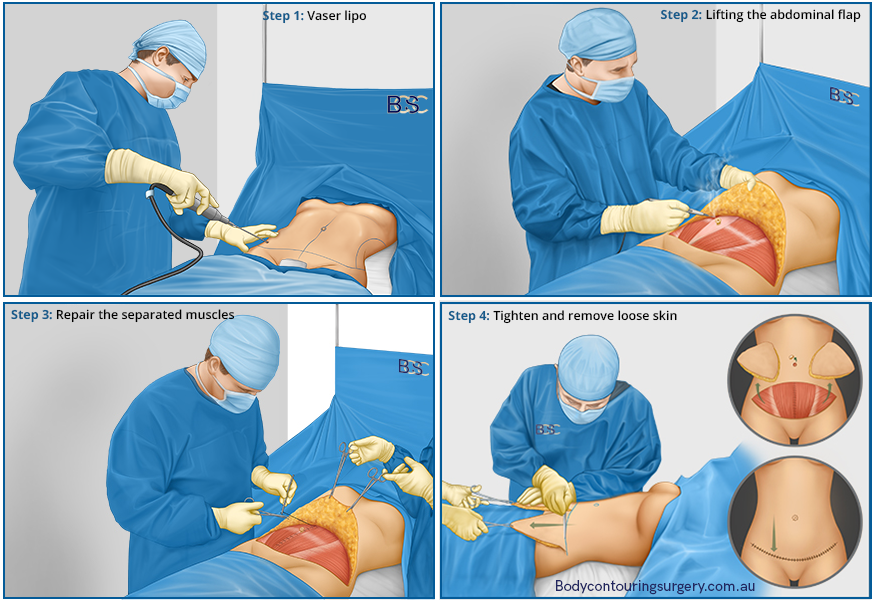
Full Abdominoplasty Surgery
A full abdominoplasty procedure, which is a more invasive procedure than a mini abdominoplasty
Depending on the amount of excess skin, I will place a horizontal incision on your lower abdomen, running from hip to hip. If there’s more significant skin, the result is a more extended incision(s) than required for a mini abdominoplasty
The more extensive the incision is, the more likely complications are possible.


Fleur De Lis Abdominoplasty
Fleur de lis is more extensive than a full abdominoplasty
FDL, Fleur de Lis carries several risks, including heavy bleeding, infection, and procedure-specific complications. A significant downside of FDL is the incision scar that is more pronounced than that of a mini or full abdominoplasty
Your Fleur de Lis cost depends on various factors, such as the number of nights you’ll spend in our private hospital, your Medicare coverage, and the complexity of the procedure. The best way to determine this is to come in for a consultation session.
Which Abdominoplasty Surgery Is Best for You?
The main determining factors are the amount of excess skin and fat I will remove and the location. If you require less skin removal, a mini abdominoplasty is your option.
I will also consider other key factors, such as skin quality, previous abdominal surgery, lifestyle, and expected results, to recommend an ideal procedure. For instance, if you’ve previously had a major surgery, such as a C-section, I will carefully consider its scarring and location to prevent complications.
Your expected results also matter a lot when choosing your abdominoplasty procedure. For instance, if you wish to repair separated abdominal muscles after your pregnancy (diastasis recti), I recommend a full or extended abdominoplasty.

FAQs
The following section will dive deeper into your
How long does Abdominoplasty surgery take?
The length of time spent in surgery during abdominoplasty, depending on your abdominal skin laxity, I could recommend incorporating VASER liposuction (suction-assisted lipectomy) to get rid of more excess fat.
The inclusion of VASER liposuction means you’ll spend an extra hour in the operating room.
Why should I stop smoking before and after my abdominoplasty?
An abdominoplasty is a major surgery, and it’s your responsibility to help reduce post-surgical complications. Smoking significantly increases the risk of developing these complications. It causes poor wound healing, increasing the risk of infection.
An NLB study shows that “[s]moking has a negative impact on skin health. Numerous studies have effectively linked smoking with delayed wound healing and healing complications. Research has identified cigarette smoking affects wound healing at a cellular level.”
The nicotine content constricts your blood vessels, increasing the chances of developing blood clots. Smoking also increases the chances of scar tissue forming, affecting your tummy tuck (Abdominoplasty) final results. The negative effects are many; it can also lead to “Smoker’s Lung.”
I recommend you quit smoking for about six weeks before and after your procedure to reduce risks.
Book your appointment online now
Dr. Beldholm’s Final Thoughts
So, is abdominoplasty major surgery? We’ve established that your abdominoplasty procedure is a major surgery. I’d like to invite you to schedule a consultative session where we’ll talk about your goals, assess your condition, and plan your surgery.
References
1. Martin D, Mantziari S, Demartines N, Hübner M; ESA Study Group. Defining Major Surgery: A Delphi Consensus Among European Surgical Association (ESA) Members. World J Surg. 2020 Jul;44(7):2211-2219
2. Scott MJ, Miller TE. Pathophysiology of major surgery and the role of enhanced recovery pathways and the anesthesiologist to improve outcomes. Anesthesiol Clin. 2015 Mar;33(1):79-91.
3. Liu D, Zhu L, Yang C. The effect of preoperative smoking and smoke cessation on wound healing and infection in post-surgery subjects: A meta-analysis. Int Wound J. 2022 Dec;19(8):2101-2106
4. de Souza Pinto EB, Abdala PC, Maciel CM, dos Santos Fde P, de Souza RP. Liposuction and VASER. Clin Plast Surg. 2006 Jan;33(1):107-15, vii
5. Dobson GP. Trauma of major surgery: A global problem that is not going away. Int J Surg. 2020 Sep;81:47-54.
6. Ellis P. The impact of smoking on wound healing: the role of the nurse. Br J Nurs. 2018 Mar 22;27(6):S10-S14.
7. Courtney A, Clymo J, Dorudi Y, Moonesinghe SR, Dorudi S. Scoping review: The terminology used to describe major abdominal surgical procedures. World J Surg. 2024 Mar;48(3):574-584.
8. McRobert J. Smoking and its effects on the healing process of chronic wounds. Br J Community Nurs. 2013 Mar;Suppl:S18, S20-3.
9. Kean J. The effects of smoking on the wound healing process. J Wound Care. 2010 Jan;19(1):5-8
10. Silverstein P. Smoking and wound healing. Am J Med. 1992 Jul 15;93(1A):22S-24S.

